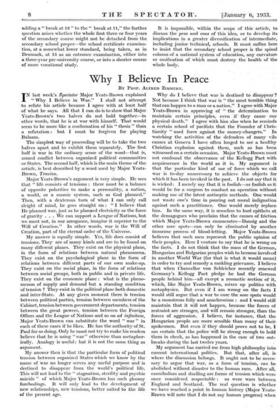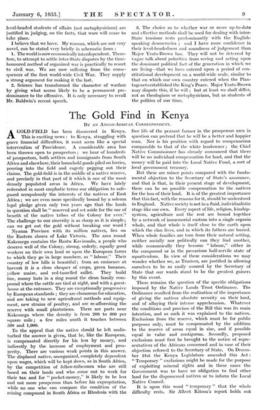Why I Believe In Peace
BY PROF. ALFRED ZI3IMERN.
TN last week's Spectator Major Yeats-Brown explained
"Why I Believe in War." I shall not attempt to refute his article because I agree with at least half of what he says. All that I can do is to show that Major Yeats-Brown's two halves do not hold together—in other words, that he is at war with himself. That would seem to be more like a confirmation of his " thesis " than a refutation : but I must be forgiven for playing Balsam.
The simplest way of proceeding will be to take the two halves apart and to exhibit them separately. The first half is war in the ordinary sense of the word—that is, armed conflict between organized political communities or States. The second half, which is the main theme of the article, is best described by a word used by Major Yeats. Brown, Tension.
Major Yeats-Brown's argument is very simple. He sees that "life consists of tensions : there must be a balance of opposite polarities to make a personality, a nation, a world, or a cosmic system, such as God planned." Then, with a dexterous turn of what I can only call sleight of mind, he goes straight on : "I believe that He planned war, just as he planned electricity or the force of gravity. . . We can support a League of Nations, but we must not, in our arrogance, imagine it superior to the Will of Creation." In other words, war is the Will of Creation, part of the eternal order of the Universe.
My answer is equally simple. Yes, life does consist of tensions. They are of many kinds and are to be found on many different planes. They exist on the physical plane, in the form of relations between natural phenomena. They exist on the psychological plane in the form of relations between different parts of our own make-up. They exist on the social plane, in the form of relations between social groups, both in public and in private life. They exist on the economic plane : what is the pheno- menon -of supply and demand but a standing condition of tension ? They exist in the political plane both domestic and inter-State. At any given moment there is tension between political parties, tension between members of the Cabinet, tensionbetween government departments, tension between the great powers, tension between the Foreign Offices and the League of Nations and so on ad infinitum, Major Yeats-Brown can substitute the word " war " in each of these cases if he likes. He has the authority of St. Paul for so doing. Only he must not try to make his readers believe that he is using " war " otherwise than metaphor- ically. Analogy is useful: but it is not the same thing as argument.
My answer then is that the particular form of political tension between organized States which we know by the name of war no longer serves any useful purpose and is destined to disappear from the world's political life. This will not lead to the " stagnation, sterility and psychic suicide" of which Major Yeats-Brown has such gloomy forebodings. It will only lead to the development of new relationships, new tensions, better suited to the life of the present age.
Why do I believe that war is destined to disappear'? Not because I think that war is "the most terrible thing that can happen to a man or a nation." I agree with Major Yeats-Brown in approving of "the determination to maintain certain principles, even if they cause our physical death." I agree with him also when he reminds a certain school of pacifists that the Founder of Chris- tianity "used force against the money-changers." In watching the activities of the defenders of many vile causes at Geneva I have often longed to see' a healthy Christian explosion against them, such as has been witnessed on a certain occasion. Major Yeats-Brown must not confound the observance of the Kellogg Pact with acquiescence in the world as it is. My argument is that the particular kind of use of force which we call war is to-day unnecessary to achieve _the objects for which it has been invoked in the past. I do not say that it is wicked : I merely say that it is foolish—as foolish as it would be for a surgeon to conduct an operation without making use of the latest antiseptic methods. One would not waste one's time in pouring out moral indignation against such a practitioner. One would merely replace him. In the same way, it is senseless to hurl epithets at the demagogues who proclaim that the causes of friction which Major Yeats-Brown enumerates—Danzig and the other sore spots—can only be eliminated by another immense process of blood-letting. Major Yeats-Brown believes that such men represent the public opinion of their peoples. Here I venture to say that he is wrong on the facte. I do not think that the mass of the German, Hungarian and Bulgarian peoples wish to become involved in another World War (for that is what it would mean) in order to try and remedy a rankling grievance. I believe that when Chancellor von Schleicher recently renewed Germany's Kellogg Pact pledge he had the German people behind him—all except a romantic section 411, which, like Major Yeats-Brown, mixes up politics with metaphysics. But even if I am wrong on the facts I would still argue that a war to cure the sore spots would be a monstrous folly and anachronism : and I would still maintain that it will not happen, because the forces of restraint are stronger, and will remain stronger, than the forces of aggression. I believe, for instance, that the Hungarian people are-more sensible than many of their spokesmen. But even if they should prove not to be, I am certain that the.police• will be strong enough to hold them in check, as has happened in the case of two out- breaks during the last twelve years.
My argument has carried me from high philosophy into current international politics. But that, after all, is where the discussion belongs. It ought not to be neces- sary to argue that war, as a form of tension, can be abolished without disaster to the human race. After all, cannibalism and duelling are forms of tension which were once considered respectable : so were wars between England and Scotland. The real question is whether we have reached a point in human history (Major Yeats- Brown will note that I do not say human progress) when
level-headed students of affairs (not metaphysicians) are justified in judging, on the facts, that wars will cease to take place.
I believe that we have. My reasons, which are not very novel, can be stated very briefly in schematic form : 1. The world is now economically interdependent. There- fore, to attempt to settle inter-State disputes by the time- honoured method of organized war is practically to resort to civil. war. We are now suffering from the conse- quences of the first world-wide Civil War. They supply a strong argument for making it the last.
2. Science has transformed the character of warfare by giving what seems likely to be a permanent pre- dominance to the offensive. It is only necessary to recall Mr. Baldvvin's recent speech. 3. The choice as to whether war or more up-to-date and effective methods shall be used for dealing with inter. State tensions rests predominantly with the English- speaking democracies ; and I have more confidence in their level-headedness and soundness of judgement than Major Yeats-Brown has. They will not be deterred by vague talk about polarities from seeing and acting upon the dominant political fact of the generation in which we are living—that we have entered upon a period of con- stitutional development on a world-wide scale, similar to that on which our own country entered when the Plan- tagenets established the King's Peace. Major Yeats-Brown may dispute this, if he will ; but at least we shall differ, not as theologians or metaphysicians, but as students of the politics of our time.





































 Previous page
Previous page